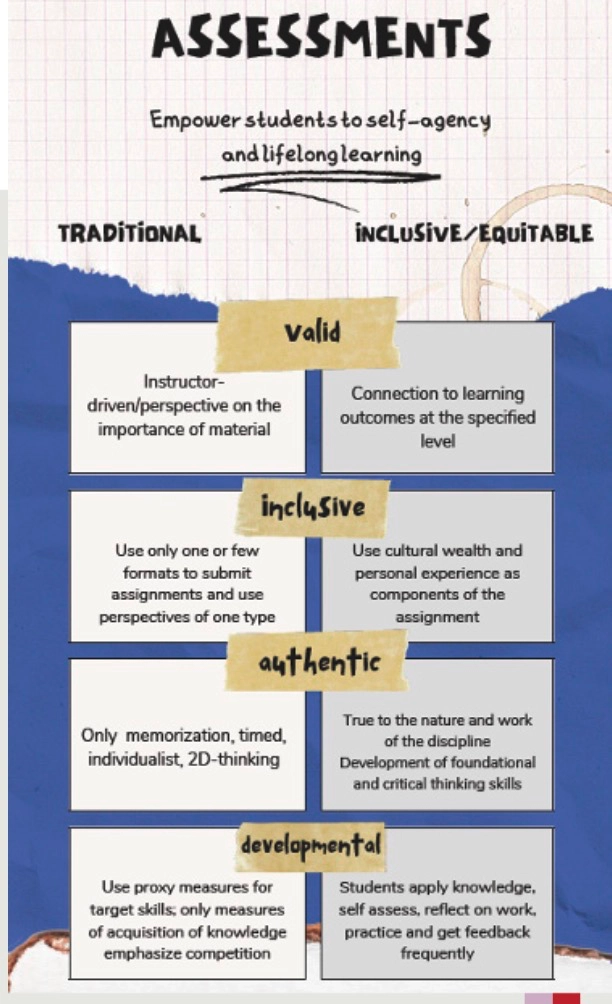Shifting from Earning to Learning. Rethinking assessment to empower students to self-agency.
Learning happens when you are vulnerable and feel safe to speak, and even fail. Incorporating equity-minded strategies and assessments can empower your students to lifelong learning.
We’ve all been there with our backs against the wall, life happening around us, and a deadline looming ahead. Yet, as professionals, we know how to plan, handle performance stresses, and aim to grow through each experience.
Students of all levels feel the pressures of performance- based assessment. Instructors use grades to measure, promote, reward, and penalize. These grades affect student outcomes and selection criteria for programs, awards, scholarships, and insurance rates. This pressure can push students toward a scarcity mindset, anxiety, amplification of negative talk, and ultimately away from learning.
Learning happens when you are vulnerable and feel safe to speak, listen, be heard, and even fail. Incorporating equity- minded strategies and assessments can empower your students to lifelong learning and self-agency.
Reflect on your learner privilege. Thinking as a facilitator of learning, I present the idea that we are all learning.
What varies between us is experience. Our students are just beginning. Reflection can help to bring awareness to your privileges as a learner (support system, institution, financial aid, community, role models) and the time you have spent with the subject. How did you connect with
and keep connected to the subject? What sparked your curiosity to know more and understand deeper? Now let’s consider the student perspective—why are they enrolling in the course? Challenging ourselves with these questions takes the focus off the instructor and gives perspective on how we might present the information from a privileged point of view. Considering our privileges as learners, where the student is, how to pique their interest, and the course learning outcomes when we set our grading policies and expectations is an excellent start to becoming equity- minded in assessment. The learning experience can be equitable, considerate of your learner population, achieve the standards of your discipline and course, and give the students agency to demonstrate competency. It takes continued small steps at a pace that allows you to see the change happening and appreciate it.
What is your assessment philosophy? Is the focus of the course centered on the instructor, institution, or learner? Next, consider the intent of the assessments:
Teaching and Learning: connection to the students, learning objectives, and delivery
Measurement: data-focused approach to student learning; working to demonstrate classroom and program impact over time
Compliance and Reporting: meeting standards to solely fulfill the program’s requirements
Student-centered: metacognitive tools and reflection for learner growth and connection; active participation of the instructor and learner in the assessment procedure
Explore more about these philosophies at the National Institute for Learning Outcomes Assessment.
Consider where your students are and how they learn.
Use pre-assessments and surveys to gauge current knowledge and skills. Learning platforms can help give you metacognitive insight into each student. Survey
and assessment data can aid in relationship building, encourage learner confidence, provide targeted support, and group students. Knowing how your students learn allows you to scaffold objectives. Together with consistent course overviews and maps of their learning, both learners and instructors can have a clear idea of how learning will be achieved
Encourage creativity in the demonstration of course competencies.
Cultural wealth comes from diverse sources: experiential, familial, aspirational, linguistic, navigational, social, and resistance (O’Shea, 2016). Allowing students to use what they know to relate and connect to the content deepens learning and encourages belonging. Get interdisciplinary and consider service learning. How can you add flexibility and creativity to your projects? Try breaking out of your discipline norms and connect with others in your institution to invigorate projects for maximum engagement.
Intentionally seek to take the anxiety out of learning.
Stress in the proper doses can heighten critical thinking, but an overload can hijack the amygdala and develop a scarcity mindset. Relationship-building, the announcement of student services, group work, low-stakes assessments, equitable grading frameworks and structures, inclusive teaching strategies, learner voice in assessment, and empathy can help lower anxiety while increasing retention, persistence, and self-agency.
Seek feedback from colleagues and students.
Organize “share your assessment” days or “grading parties’. Craft evaluation survey questions that allow anonymity and insight. Convey to your students how this feedback will help you and the community grow, while making the experience richer for everyone.
Belonging is greatly affected by grading structures and systems. These grades and measures of competence determine if students will attain their degrees and be prepared for their future careers. The instructor’s cultural, personal, professional, and institutional practices and beliefs can tip the balance of this measure.

Using an equity lens to analyze our assessment philosophy, we can inspire and encourage students to learn and persist because they believe they can succeed and gain a strong sense of belonging. Space to make mistakes in learning to achieve understanding can shift the learner from earning points to learning and retaining concepts, persistence, and success!



